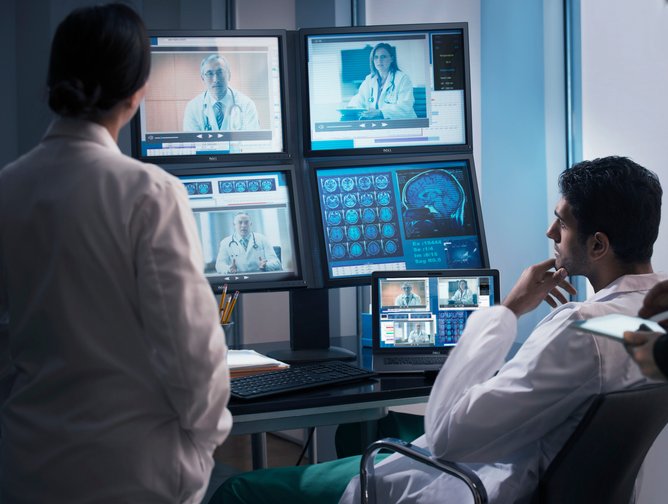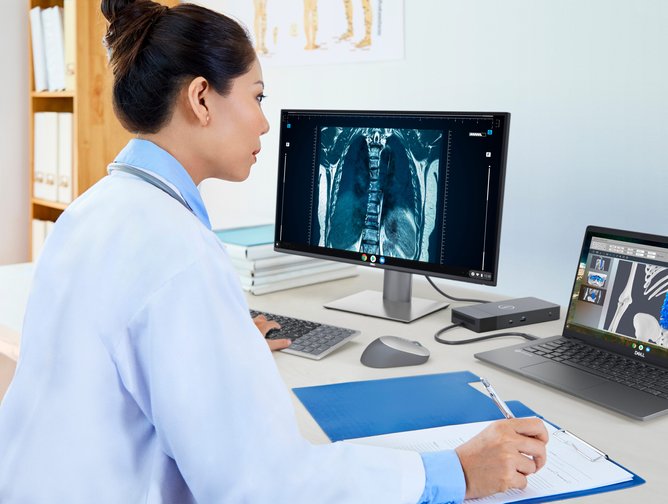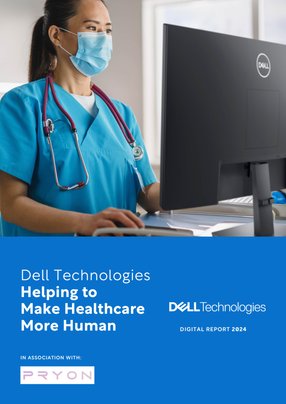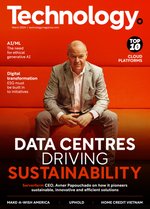Dell Technologies: Helping to Make Healthcare More Human
It’s safe to say technology has enriched the world in a multitude of ways. And the story is no different for the healthcare and life sciences sector. From improving the quality and coordination of healthcare delivery to boosting the accessibility of therapies — or even reducing cost — to driving efficiency and filling gaps in the human workforce, the possibilities presented by technology are endless.
In the eyes of Dell Technologies’ Steven Lazer, the main way technology plays a role is, in the simplest terms, by improving peoples’ lives.
As Global Healthcare & Life Sciences CTO, Lazer works in healthcare worldwide while also operating alongside life sciences organisations which utilise Dell's intellectual property to improve their capabilities — whether that be improving patient outcomes, the lives of clinicians or even, more broadly, by changing how healthcare is delivered.
Lazer’s career in technology spans more than three decades. Initially focused on core technology, he later transitioned to collaborating with numerous healthcare organisations, playing a key role in constructing their digital infrastructure.
“I now have the luxury of working in healthcare every day,” Lazer shares. “I've been in technology for a very long time. I had reached a point in my career where I thought, ‘how do I apply that to something that does some good?’ I really try to find ways to give back to healthcare. It’s more from an altruistic perspective that I was joining healthcare, and I haven't left in more than 25 years.”
Facilitating healthcare equity worldwide
Lazer's unadulterated passion for both people and his work, which well and truly shines through, was sparked by a startling first-hand encounter with a patient in need.
“I had a very defining moment in my career when I was working within the healthcare system,” he begins. “We were talking about creating a new networking closet for the imaging department when the doors to the room burst open and a gurney came between myself and the project manager. On that gurney was a patient with about three quarters of a head. It was very startling, but the shock helped me realise why I do what I do. That was a turning point in my career that fuelled my passion, and it has stuck with me ever since.”
Spurred on by a passion to care for people, Lazer has a firm focus on finding the most efficient ways to offer the best, and often simplified, care around the world.
“I was meeting with the CIO for the country of Botswana several years ago and figuring out a way to be able to provide healthcare — literally in a hut,” he says. “We're talking sticks and grass. How do we provide healthcare out there, even if it's only for limited hours of a day, rather than having those patients die helplessly in the bush?”
Lazer’s involvement in this particular project was one of the early successes of providing a small element of technology to enhance people’s access to life-saving healthcare. Similar has happened through Dell’s incredible ongoing Digital Life Care platform in India, that provides some healthcare and technology capabilities to more than 238 million people alongside Dell’s partners.
“The ability to enable healthcare, especially during early COVID-19 days, was amazing,” he adds with pride. “No two days are the same — that's why I love what I do. Some days I'm thinking about technology all day long; others we're talking about healthcare and care delivery or how to deal with regulatory issues and bringing information and care to other people. It's looking at ways that we utilise technology to bring everything together that really has the power to affect change in the world.”
The ‘we’ Lazer refers to is the extended global, 200-strong team. This team is one small cog in the gigantic machine that drives Founder, Chairman and CEO Michael Dell’s ambitious goal of impacting the lives of a billion people in an enduring way by 2030, with Digital Life Care being one shining example of Dell’s ongoing success in working toward this lofty target. Another is a Dell programme based in Germany, where the technology giant is investigating how it can impact the lives of recently diagnosed cancer patients from a behavioural health perspective.
Dell is also collaborating with a children's hospital on a comparable scale, coming alongside caregivers in a highly consultative fashion to ensure that patients don't carry illnesses into adulthood. “There is also the sustainability aspect, so we develop technologies that are reducing overall costs of operation and overall impact from an energy consumption perspective,” Lazer continues.
“I am the luckiest guy in the world that I get to work with this organisation and have the role that I do.”
Even though Dell Technologies is a technology company, it’s equally passionate about having a significant impact on human progress.
“Technology is not the leading aspect of this; it's the trailing aspect,” he continues, likening it to a supporting role. “Our job is about what we are going to do with that technology and how we drive change.”
‘The world of healthcare needs to continue it’s evolution
Acknowledging the elephant in the room — that the world of healthcare is facing a global shortage of clinicians — Lazer is keen to make an impact by utilising technologies to relieve the burden of mundane tasks.
“The way we impact the world changes the way we deliver care,” he states firmly. “We talk about it from a digital technology and digital transformation perspective, not as the end itself, but as a means to deliver the outcome of improving patient and clinician lives.
“Imagine what the world would be like if we were still operating on paper. Electronic medical records have caught on around the globe, providing the ability to share information.
“If I go back to my early days of technology, we never would've even dreamed of talking about technology the way we are today.”
Here, he’s referring to the likes of quantum computing and AI. Lazer advocates that, although AI boasts a wealth of opportunities, governance is needed to ensure models like public Large Language Models (LLMs) do not hallucinate and provide false information — something that could have a disastrous effect on someone’s potentially life-saving care.
Lazer elaborates: “In healthcare, we're seeing AI much more on the operational side. We're still in a learning phase of understanding how it can impact care and care delivery. No matter what, AI requires some human oversight, without a doubt. Regardless, AI unequivocally necessitates human oversight to prevent any potential harm or negative consequences.”
But it's in research that AI really shines, particularly when it comes to exploring and consolidating available information. For example, a Dell customer recently shared with Lazer that it is sitting on 400 years of clinical information, but struggling to utilise it and keep it safe.
“AI remembers all of that information and almost instantaneously,” applauds Lazer, “and has the ability to search and find new correlations and vectors. When we start to talk about things like graphing database capabilities or seeing research from an AI perspective, there is a possibility to generate concepts for new compounds from a drug capability perspective and new clinical models for compounds. AI can shorten the time for drug discovery from years down to months on average. It really makes a difference.”
Technology enhancing healthcare sustainability
Technology has the potential to significantly transform the implementation of healthcare, and this extends to the industry’s sustainability efforts as well. A core part of Dell’s operations, whether it be reusable and returnable packaging, bioplastics or offering a financial bounty for retired hardware to be recycled, Dell Technologies prides itself on being ahead of the curve in all elements of its operations, and sustainability is no exception.
And, as the corporation is building its latest technologies, products’ environmental legacies are adapting to prepare for future conditions.
“Imagine operating environments at 35°C that we don't operate at today,” Lazer says. “We're typically trying to operate closer to 20°C inside data centres, for example. Imagine what would happen if we could provide full performance, full capability at 35°C, reducing the overall cost of cooling, thereby reducing the overall energy consumption of the data centre by almost a third. It's a pretty amazing approach.”
Dell is also working on innovations like liquid cooling and utilising waste heat, for example, to mitigate its environmental impact and set an example for others to follow, curbing their emissions and consumption, too.
Lazer continues: “There are many, many possibilities and all we have to do is take a look at what's going on to provide these capabilities. From a core organisational perspective, sustainability is a key part of what we do every day.”
Working through the noise of technology
Despite technology offering endless possibilities, Lazer acknowledges that, alongside the wealth of opportunities, technology also creates a lot of noise that needs to be filtered through to harness the best of its capabilities.
“Utilising things like AI and ML capabilities will help here,” he notes. “We generate 10,000 metrics every single day for a particular patient, for example, so how do we get through all of the noise and surface what makes sense? We need to make it so clinicians can look at a consolidated view of what they need to see, be alerted when needed and take action.”
Thanks to Dell’s vast portfolio of products and solutions, it is best poised in this space to be the instigators of meaningful change that Lazer lobbies hard for. Incorporating innovations like edge technology and the ability to deploy AI globally, these capabilities are seamlessly managed through Dell’s technology infrastructure. Lazer is firm in his belief that Dell’s technology will continue to enrich the sector and enhance the capabilities of its workforce, rather than taking any jobs away.
Although Dell is a giant in the technology space and is blazing this path, Lazer notes that having a strong pool of partner businesses is crucial to the company’s success.
“Our partner ecosystem is very, very large,” Lazer shares. “There are literally hundreds of partners that we work with on a regular basis in healthcare and life sciences alone.”
Partners like AI-powered software company Pryon, for example — founded in 2017 by the minds behind Amazon’s Alexa, Apple’s Siri and IBM’s Watson — provide value for Dell from an AI perspective.
“They’re pioneers in generative AI,” he continues. “They've helped build this from the ground up based upon developments and capabilities that they have in their portfolio and background. To me that is one of the key ways that we can bring forward technology, through a partner that is going to add something new and different that will not only support the capabilities of what we're doing today, but enhance them, too.
“Our partner community is extremely tight. Dell Technologies has a strong healthcare practice with more than 30 years of building solutions around the globe with our clinical independent software vendor (ISV) partners and providing essential technology infrastructure to hospitals of all sizes, and our expertise continues to grow. Engaging with those organisations — and properly — can only be accomplished if we have these strong partnerships.
“We have a great partnership with Pryon and we look forward to seeing this continue.”
Dell Technologies and the future of healthcare
Significant continued engagement is on the horizon for Dell as it explores the AI landscape before it, evolving in real-time. This has an impact on how the market will adapt and grow. With the likes of regulation still unknown, Dell is poised and ready for what is next.
Lazer says: “We will guide Dell Technologies down the right pathways with AI capabilities, especially as we look at healthcare and life sciences. In addition to that, quantum computing will drop onto the scene very quickly. It's one of those mind-blowing technologies that you're going to see come forward in the very near-term future, and Dell Technologies is going to continue to invest in these emerging technologies.”
As for Lazer, he is steadfast and focused on continuing down his path of passion when it comes to engaging and democratising healthcare, bringing care and technology capabilities around the world to the best of his abilities and by all means available.
He concludes: “We will continue to improve care around the globe and really impact the lives of a billion people. I feel passionate about this mission right to my very core.”
Make sure you check out the latest edition of Technology Magazine and also sign up to our global conference series - Tech & AI LIVE 2024
**************
Technology Magazine is a BizClik brand




- Top 100 Women 2024: Robyn Denholm, Tesla - No. 8AI & Machine Learning
- Top 100 Women 2024: Safra Catz, Oracle - No. 7Digital Transformation
- Advancing AI in Retail with Pick N Pay's Leon Van NiekerkAI & Machine Learning
- OpenText’s Muhi Majzoub: Engineering Platform Growth with AIEnterprise IT


